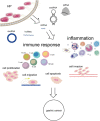The role of non-coding RNA in the diagnosis and treatment of Helicobacter pylori-related gastric cancer, with a focus on inflammation and immune response
- PMID: 36314013
- PMCID: PMC9606473
- DOI: 10.3389/fmed.2022.1009021
The role of non-coding RNA in the diagnosis and treatment of Helicobacter pylori-related gastric cancer, with a focus on inflammation and immune response
Abstract
Helicobacter pylori (H. pylori) is one of the globally recognized causative factors of gastric cancer (GC). Currently, no definite therapy and drugs for H. pylori-related GC have been widely acknowledged although H. pylori infection could be eradicated in early stage. Inflammation and immune response are spontaneous essential stages during H. pylori infection. H pylori may mediate immune escape by affecting inflammation and immune response, leading to gastric carcinogenesis. As an important component of transcriptome, non-coding RNAs (ncRNAs) have been proven to play crucial roles in the genesis and development of H. pylori-induced GC. This review briefly described the effects of ncRNAs on H. pylori-related GC from the perspective of inflammation and immune response, as well as their association with inflammatory reaction and immune microenvironment. We aim to explore the potential of ncRNAs as markers for the early diagnosis, prognosis, and treatment of H. pylori-related GC. The ncRNAs involved in H. pylori-related GC may all hold promise as novel therapeutic targets for immunotherapy.
Keywords: H. pylori-related GC; Helicobacter pylori; immune response; inflammation; microRNA; non-coding RNA.
Copyright © 2022 Liu, Yan, Jiang, Lv, Li and Wang.
Conflict of interest statement
The authors declare that the research was conducted in the absence of any commercial or financial relationships that could be construed as a potential conflict of interest.
Figures


Similar articles
-
Research progress on molecular mechanism of pyroptosis caused by Helicobacter pylori in gastric cancer.Ann Med Surg (Lond). 2024 Feb 15;86(4):2016-2022. doi: 10.1097/MS9.0000000000001802. eCollection 2024 Apr. Ann Med Surg (Lond). 2024. PMID: 38576917 Free PMC article. Review.
-
JAK-STAT1 Signaling Pathway Is an Early Response to Helicobacter pylori Infection and Contributes to Immune Escape and Gastric Carcinogenesis.Int J Mol Sci. 2022 Apr 8;23(8):4147. doi: 10.3390/ijms23084147. Int J Mol Sci. 2022. PMID: 35456965 Free PMC article.
-
Role of microRNAs and Exosomes in Helicobacter pylori and Epstein-Barr Virus Associated Gastric Cancers.Front Microbiol. 2018 Apr 5;9:636. doi: 10.3389/fmicb.2018.00636. eCollection 2018. Front Microbiol. 2018. PMID: 29675003 Free PMC article. Review.
-
Chronic inflammation and long-lasting changes in the gastric mucosa after Helicobacter pylori infection involved in gastric cancer.Inflamm Res. 2021 Dec;70(10-12):1015-1026. doi: 10.1007/s00011-021-01501-x. Epub 2021 Sep 21. Inflamm Res. 2021. PMID: 34549319 Review.
-
Helicobacter pylori infection, H19 and LINC00152 expression in serum and risk of gastric cancer in a Chinese population.Cancer Epidemiol. 2016 Oct;44:147-153. doi: 10.1016/j.canep.2016.08.015. Epub 2016 Sep 1. Cancer Epidemiol. 2016. PMID: 27592063
Cited by
-
Identification of Immune Infiltrating Cell-Related Biomarkers in Early Gastric Cancer Progression.Technol Cancer Res Treat. 2024 Jan-Dec;23:15330338241262724. doi: 10.1177/15330338241262724. Technol Cancer Res Treat. 2024. PMID: 38860335 Free PMC article.
-
Vacuolating Cytotoxin A (VacA) and Extracellular Vesicles in Helicobacter pylori: Two Key Arms in Disease Development.Iran J Pathol. 2025;20(1):1-17. doi: 10.30699/ijp.2024.2031417.3312. Epub 2024 Jan 10. Iran J Pathol. 2025. PMID: 40060221 Free PMC article. Review.
-
Unraveling Helicobacter pylori: Insights into Pathogenesis, Immune Evasion, and Progress Toward Effective Vaccination.Vaccines (Basel). 2025 Jul 3;13(7):725. doi: 10.3390/vaccines13070725. Vaccines (Basel). 2025. PMID: 40733702 Free PMC article. Review.
References
-
- Sung H, Ferlay J, Siegel RL, Laversanne M, Soerjomataram I, Jemal A, et al. Global cancer statistics 2020: GLOBOCAN estimates of incidence and mortality worldwide for 36 Cancers in 185 countries. CA Cancer J Clin. (2021) 71:209–49. - PubMed
-
- Wang F, Meng W, Wang B, Qiao L. Helicobacter Pylori-induced gastric inflammation and gastric cancer. Cancer Lett. (2014) 345:196–202. - PubMed
-
- Crowe SE. Helicobacter pylori infection. N Engl J Med. (2019) 380:1158–65. - PubMed
Publication types
LinkOut - more resources
Full Text Sources
Research Materials
Miscellaneous

